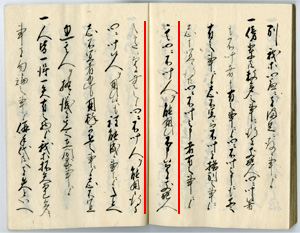These words were written in 1748 by Irie Tomotoshi (younger full brother of Tomomasa, the fifth head of the Sumitomo family), the owner of a money changing business in Bungomachi, as a management principle for the edification of Jyurobee, who was responsible for running the business.
Tomotoshi wrote: “So many people are working for Sumitomo. Some are obedient and some are not. If some do not heed what you say, they may have compelling reasons. Malicious people can’t be tolerated, but men of conviction sometimes don’t follow their superiors. You are unworthy to be their superior if you can’t skillfully make good use of them. Superiors tend to alienate disobedient subordinates, but you should not do that. Rather, you should skillfully make good use of such men.”
Tomotoshi himself was a learned man. He pursued classical Chinese studies as a student of Goi Ranshu (Confucian scholar in Osaka in the early 18th century), waka Japanese poetry mentored by Reizei Tamemura (aristocrat and poet in the mid Edo era), and kokugaku Japanese studies and Shinto under Hara Kiyoshige (pupil of Yamazaki Ansai, Confucian scholar and Shinto scholar). Drawing on his learning, Tomotoshi authored several memoranda about Sumitomo. The house rules and regulations in these memoranda constituted the core of the Rules Governing the House of Sumitomo formulated in 1882, which served as the guiding principles of Sumitomo’s business development.

 EN
EN